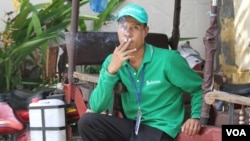With only three months remaining before the government is due to impose a nationwide smoking ban, it used World No Smoking Day on Monday to raise awareness of the harmful effects of tobacco.
A sub-decree prohibiting smoking in public areas came into force in March, but the government said at the time it would wait six months before enforcing the ban to allow time for public education.
After the deadline of September, people caught smoking in areas where the ban applies will face fines of between 20,000 riel (about $5) and 50,000 riel (about $12.50).
Areas where the ban will take effect include restaurants, offices, government buildings, hospitals, schools and parks.
Dr. Chhea Chho Daphea, director of the National Health Promotion Center, said there had already been some signs that smoking was on the decline since the government began its anti-smoking campaign.
“We have always raised awareness and educated people not to smoke using different approaches; as a result, the prevalence of smoking has been decreasing by 5 percent or 6 percent each year,” she said.
At an event to mark World No Tobacco Day on last week, attendees touted the idea of reducing branding on tobacco products, which studies have shown can reduce levels of smoking.
Dr. Yel Daravuth, a technical officer with the World Health Organization in Cambodia, said other measures such as reducing tobacco advertising, could also help.
“After that [six months], the inspectors from the Ministry of Health will check if the stakeholders follow the rule,” he said, adding that an estimated 2 million Cambodians were regular smokers.
“If someone used to smoke 20 cigarettes per day when he could smoke wherever he wanted, now when he wants to smoke he will need to leave the area of the ban, so he may only smoke 10 a day.”
Inhaling secondhand smoke is also a major concern, with Cambodia holding the worst rates of secondhand smoke inhalation at public places such as restaurants among Asean countries, official figures suggest.
Early this year, Prime Minister Hun Sen, who had smoked for three decades, announced – not for the first time – that he had quit smoking and called on the public to follow his lead.







